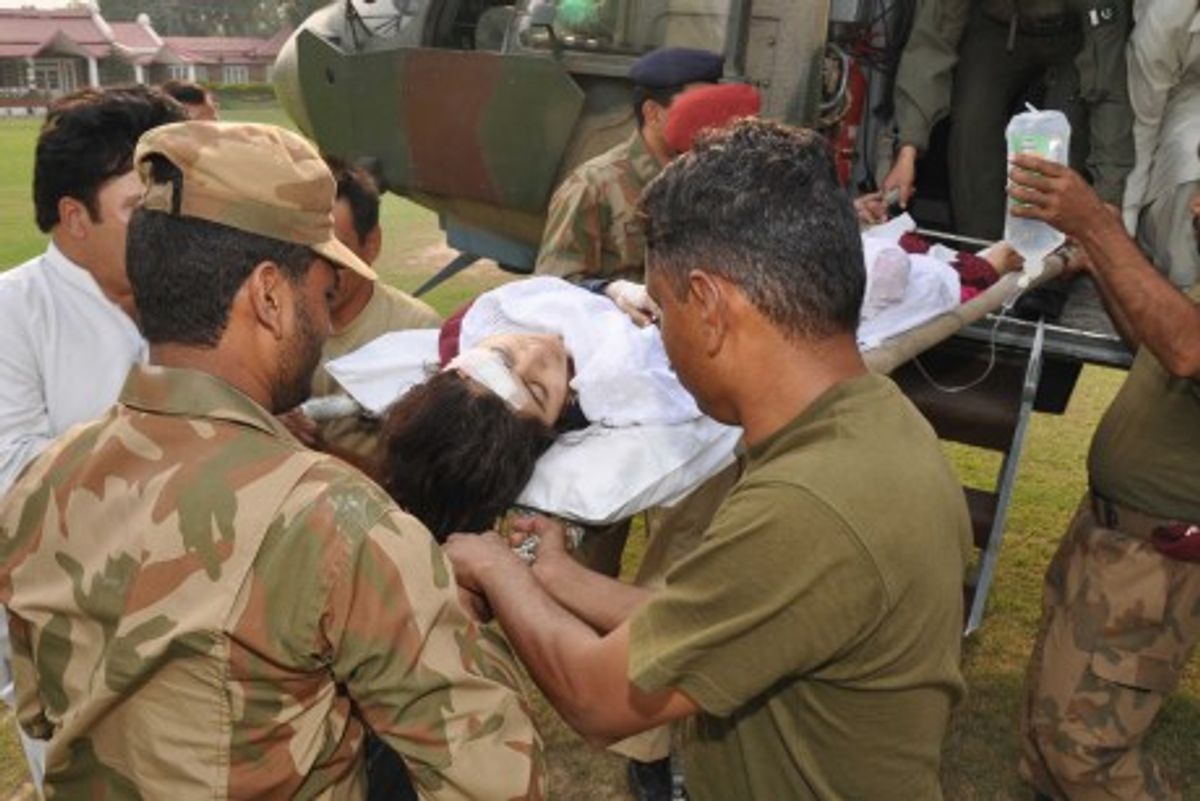BIRMINGHAM, England (AP) -- British police have questioned two people who tried to visit a hospitalized Pakistani teenager shot for promoting girls' education, raising fears about her safety following pledges by the Taliban to make another attempt on her life.
Fourteen-year-old Malala Yousufzai was shot in the head by the Taliban last week as she was returning home from school in Pakistan. She was airlifted Monday to Britain to receive specialized medical care and protection from follow-up attacks threatened by the militants.
Medical Director Dr. Dave Rosser of the Queen Elizabeth Hospital in Birmingham stressed Tuesday that security was "under control" at the hospital after the overnight incident. He said several people had turned up at the hospital claiming to be the girl's relatives but didn't get very far.
He said the people were arrested, but police said they had only been questioned.
"We don't believe there's any threat to her personal security," Rosser told journalists, explaining the hospital did not believe the suspects were related to Malala. "We think it's probably people being over-curious."
Police would not immediately confirm the details of the incident.
Malala was targeted by the Taliban for promoting girls' education and criticizing the militant group's behavior when they took over the scenic Swat Valley where she lived. Two of her classmates were also wounded in the attack and are receiving treatment in Pakistan.
The attack on the girls horrified people in Pakistan and across the world. Pakistani President Asif Ali Zardari said Malala had become "a symbol of all that is good in us."
"The work she did is far higher before God than that which is being done by terrorists in the name of religion," he said at the Economic Cooperation Organization Summit in Baku, the capital of Azerbaijan. "We will continue her bright work."
Pakistani Interior Minister Rehman Malik has announced a $1 million bounty for Pakistani Taliban spokesman Ahsanullah Ahsan, saying he was the one who announced that the Taliban carried out the attack on Malala.
The Taliban has threatened to target Malala until she is killed because she promotes "Western thinking."
Rosser said Malala is proving to be strong so far, but did not elaborate about her recovery.
Doctors are optimistic that Malala's age is in her favor. Unlike adults, the brains of teenagers are still growing and better able to adapt to trauma.
Teens also are generally healthier and their bodies have a stronger ability to react to the disruption that the injury causes, said Dr. Jonathan Fellus, chief scientific officer at the New Jersey-based International Brain Research Foundation.
"It helps to be young and resilient to weather that storm," he said. "Because her brain is continuing to develop at that age, she may have more flexibility in the brain."
There's also a psychological aspect to why youngsters have a better shot at recovery. While injured adults often mourn the loss of what they had, teens don't know what they are missing.
"They have an amazing capacity for hope," Fellus said. In Malala's case, her strong personality would also help her recover, he added.
Still, doctors cautioned that it is impossible to say how Malala will do without knowing the path of the bullet and what damages it caused, details that have not been released.
"The brain is like real estate," said Dr. Anders Cohen, chief of neurosurgery at The Brooklyn Hospital Center in New York. "Location is everything.
"Based on the information we have, it appears that Malala was shot from the front down diagonally, but we don't know what part of the brain the bullet went through, whether it crossed the midline and hit any vessels, or whether the bullet passed through the right or left side of the brain."
But both physicians say it is extremely unlikely that a full recovery can be made. They could only hope that the bullet took a "lucky path" - going through a more "silent," or less active - part of the brain.
"You don't have a bullet go through your brain and have a full recovery," Fellus said.
---



Shares